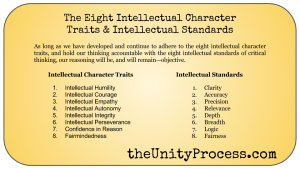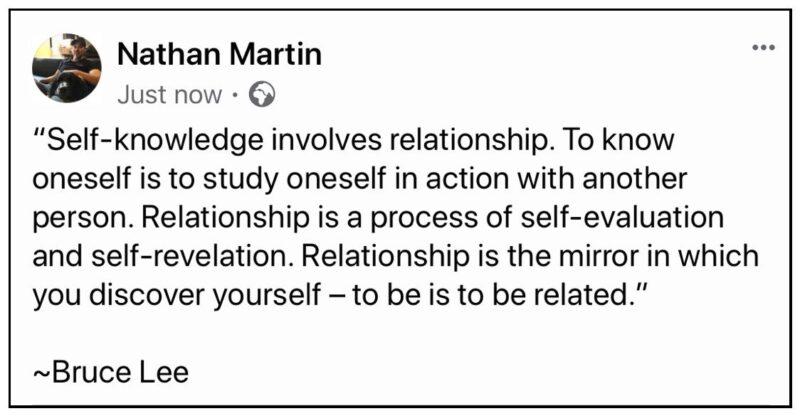Jesus is likely everything that churches say he is, however, that is very limiting in a practical sense, and not as transformative as experiencing a life with Jesus in our hearts could be. I think we need to expand the definition of Jesus in our thinking to incorporate certain Logocentric character traits and universal standards that dramatically improve our thinking, feeling, and behaviors in a very practical and tangible manner that is sustainable.
In the beginning was the Word [Logos], and the Logos was with God, and the Logos was God. He was in the beginning with God. All things were made through Him, and without Him nothing was made that was made. ~John 1:1-3 NKJV
One cannot understand what the Gospel of John was saying without having a grounded understanding (reason/purpose) of what the “Logos” means. The Logos is an ancient concept, one that the Gospel of John intimately understood and used to speak to its readers. Additionally, Logos literally means “logic” and reason in the Greek. It is my contention that John chapter one was John’s hint that we should understand the Greek concept of the Logos in conjunction with Jesus, because he puts it at the foundation of his gospel. I think this is why the Gentiles flocked to Christianity, because Jesus was already in their awareness for several hundred years prior to his arrival in Israel, and he put a relatable personality on the concept. If we don’t understand the Greek concept of the Logos, or understand how Socrates, Plato, and Aristotle thought and worked, we very well may miss out on a deeper and richer life filled with higher Logocentric meaning and purpose.
Being Logocentric (Logos focused) is living our lives through focusing on the deeper meaning (purpose, understanding) found within our words, ideas, and especially drawing out the meaning and purpose of both our positive and negative experiences in a truthful manner. The Enlightenment period was mostly concerned with Logocentrism, which is focusing on the value of reason, using it to give meaning in life, and conveying that meaning through words. It combines both the concept of sovereignty and magic within it, thus fulfilling the archetypes of the “King” and the “Priest” that Jesus was said to have represented. The law of reason makes one sovereign, while being able to articulate the depth of meaning with words makes one a priest/magician. Logocentrism greatly impacted western society, which is what Marxism, deconstructionism, postmodernism, etc., are attempting to subvert. Logocentrism, aka Christ, is their enemy, and they will stop at nothing to undo the liberty we’ve achieved as a result of it; if Logocentrism is the spirit of Christ in us via meaning and purpose, then nihilism is the spirit of anti-Christ, since it is all about life being reduced to “meaninglessness”.

In John 8, Jesus speaks to some of the religious leaders of the day, and today it could be any Karen, politician, or do-gooding social worker he would be speaking to. If the adversary is a liar, and Jesus represents understanding, and God the Father represents wisdom and Truth, then it is a good idea to learn how to spot lies and discern truth, and for that there are eight character traits and eight universal principles that we should learn and integrate in order to be more aligned with Truth and less aligned with lies (and the father of lies).
39 They answered him, “Abraham is our father.” Jesus said to them, “If you were Abraham’s children, you would be doing the works Abraham did, 40 but now you seek to kill me, a man who has told you the truth that I heard from God. This is not what Abraham did. 41 You are doing the works your father did.” They said to him, “We were not born of sexual immorality. We have one Father—even God.” 42 Jesus said to them, “If God were your Father, you would love me, for I came from God and I am here. I came not of my own accord, but he sent me. 43 Why do you not understand what I say? It is because you cannot bear to hear my word. 44 You are of your father the devil, and your will is to do your father’s desires. He was a murderer from the beginning, and does not stand in the truth, because there is no truth in him. When he lies, he speaks out of his own character, for he is a liar and the father of lies. 45 But because I tell the truth, you do not believe me. 46 Which one of you convicts me of sin? If I tell the truth, why do you not believe me? 47 Whoever is of God hears the words of God. The reason why you do not hear them is that you are not of God.” ~John 8:39-47 (NIV)
I voluntarily submit my thinking, and therefore myself, to the Logos, aka to the universal blueprint of divine reason, humility, empathy, and courage—I experience the Logos as an objective and transformative process and principles, Divine character traits and rules of thinking that act as my foundation that govern my thought processes, my feelings, and my behaviors, and they also happen to govern my conversations with other thinkers too. These are objective principles of thought that are now embedded deeply in my heart via my intentional development of my inner character, so in my opinion we should submit to objective and divine principles that lie beyond subjective human perception, but not to externalized systems that claim divine or other authority.
According to Richard Paul at CriticalThinking.org:
Eight intellectual standards:
clarity, accuracy, precision, relevance, depth, breadth, logic, fairness.
Eight intellectual character traits:
humility, courage, empathy, autonomy, integrity, perseverance, confidence in reason, and fairmindedness.
These objective standards give us the ability to assess our thinking and creativity step by step, and I submit myself to them, and this process of submitting to them on a daily basis, especially when I point them inwards in self-assessment and reflection to find the causes to my emotional upsets, irrationality, and blind spots (aka, shining the light of conscious rational thought on any unconscious irrational thinking, feeling, and behaviors still within me), develops my inner character further, so that I can be even more humble, courageous, empathetic, autonomous, have integrity, persevere, be more confidant in reason, and become ever more fairminded.
“Human rationality is fair-minded and self-developing while irrationality (or egocentrism) is selfish and self-validating. All irrationality presupposes some degree of unconsciousness in order to function self-deceptively. Most rational thought functions consciously. Because irrationality appears to the mind as reasonable, we must develop strategies for disclosing irrational thought.” ~Richard Paul & Linda Elder, “The Miniature Guide to the Human Mind”
In my reasoned estimation and personal experience, to submit to these standards, and to apply them to one’s own thinking in order to develop their inner character, is submission to the Divine Logos; it is inviting Jesus into one’s own heart and allowing him to transform their thoughts, feelings, and behaviors, which empowers them to live an objectively moral life.
“A mind that does not systematically and effectively embody intellectual criteria and standards is not disciplined in reasoning things through. Such a mind is not creative. There is, in other words, a reciprocal logic to both intellectual creation and critical judgment. There is an intimate interrelation between the intellectual making of things and the ongoing critique of that making. Let us examine this reciprocal logic more closely, through some examples.
Painters alternate the application of small amounts of paint to a canvas with the act of stepping back to appraise or assess their work. There are hundreds of acts of assessment that accompany hundreds of brush strokes. In a parallel fashion dancers use mirrors in the studio to observe their dancing while they are dancing. They use what they see in the mirrors as data to assess their performance. They engage in hundreds of acts of assessment in the light of images their minds form as they dance. They practice with a conception in their minds of what they are striving to create. They then assess the gap between the conception they are aiming at and the performance they see. They both create and assess their dancing.”
~ Richard Paul & Linda Elder, “The Nature of Critical and Creative Thinking”
Self-assessing rationality, as a means of developing one’s inner character, is objective morality, and makes those who do so moral individuals. Morality is not found “out there” in a religious code, but rather it is found through the exercising of the will by loving, submitting to, and serving the processes that allows one to arrive at Truth above all else, especially above one’s own egocentric pride and need for survival.
“A rational process is a moral process. You may make an error at any step of it, with nothing to protect you but your own severity, or you may try to cheat, to fake the evidence and evade the effort of the quest – but if devotion to the truth is the hallmark of morality, then there is no greater, nobler, more heroic form of devotion than the act of a man who assumes the responsibility of thinking.” ~Ayn Rand
EDIT: Adding this quote by Bruce Lee on self-assessment, as relationships are the perfect tool and mirror to assist in our growth process, and how our relationships can help us to become even more aligned with the Logos.
“Self-knowledge involves relationship. To know oneself is to study oneself in action with another person. Relationship is a process of self evaluation and self revelation. Relationship is the mirror in which you discover yourself — to be is to be related.” ~Bruce Lee
THE UNITY PROCESS: I’ve created an integrative methodology called the Unity Process, which combines the philosophy of Natural Law, the Trivium Method, Socratic Questioning, Jungian shadow work, and Meridian Tapping—into an easy to use system that allows people to process their emotional upsets, work through trauma, correct poor thinking, discover meaning, set healthy boundaries, refine their viewpoints, and to achieve a positive focus. You can give it a try by contacting me for a private session.
Did you enjoy the article? Show your appreciation and buy me a coffee:
Bitcoin: bc1q0dr3t3qxs70zl0y5ccz7zesdepek3hs8mq9q76
Doge: DBLkU7R4fd9VsMKimi7X8EtMnDJPUdnWrZ
XRP: r4pwVyTu2UwpcM7ZXavt98AgFXRLre52aj
MATIC: 0xEf62e7C4Eaf72504de70f28CDf43D1b382c8263F



2 Responses to “Submission to the Logos and Self-Assessment/Reflection”
Read below or add a comment...
Trackbacks
[…] beings that regulates both the heart and root poles, and is where we need to invite “Jesus (the Logos) into our hearts” by upgrading our character, but unfortunately, the 3rd chakra, which […]
[…] be morally superior to another person, but only if they’ve actually worked the process of self-reflection and psychological integration that would cause them to be morally superior in comparison to […]